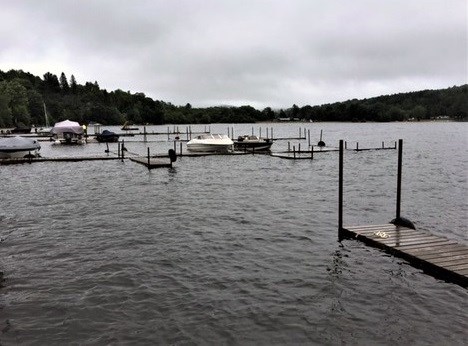Four Almaguin Highlands municipalities are worried about the damage Doe Lake causes to marine owners, their docks and the docks of private cottage owners after major rainfalls.
Armour Township has been asking the surrounding municipalities to help it form a political association so the townships can take their concerns to the Ministry of Natural Resources and Forestry and to speak with one voice.
The townships of Perry and Ryerson have signed on to form the political group and it's expected McMurrich Monteith will also join once the request from Armour appears at a future council meeting.
Doe Lake is contained within the four municipalities and that's why they want to talk to the ministry as one group.
Armour Mayor Bob MacPhail says the water damage from Doe Lake is a relatively new problem that can be traced back to the late 1990s.
It used to be that the MNRF would let a business owner pull the logs from Watt's Dam on Doe Lake ahead of rainfall so the lake level would not rise significantly, then put the logs back after the storm passed.
“But the MNRF no longer allows private citizens to touch the dams,” MacPhail says.
He characterizes this decision as reactive rather than proactive because a method existed in the past to prevent water damage from the outset.
What normally happens, McPhail says, is the MNRF staff will pull the logs to ease the lake level after it's rained but, because of ministry cutbacks, ‘chances are the logs might not get pulled until Monday and that’s not acceptable.
“The old way worked and we want to tell the MNRF rather than be reactive, we want to go back to the good old days when we were proactive and got the logs out before it rained,” MacPhail said.
MacPhail speaks from experience. He used to own a campground at Doe Lake in the late 1990s before selling it in 2005.
“When the marine operator was allowed to remove the logs back then it was pretty good,” MacPhail said.
“My docks were not underwater.”
Friday he visited the campground he once owned, four days after a major rainfall.
The “docks were just sitting on top of the water and a couple of more inches and they would be underwater.”
This is the effect marine owners face when the logs at Watt's Dam are not pulled ahead of major rainstorms, he said.
He says during a rainfall, water goes through a dam in Kearney, makes its way along the Magnetawan River “and fills up Doe Lake in those worst-case scenarios.”
Compounding the problem is Doe Lake is surrounded by about 25 kilometres of shoreline which connect to streams, rivers and creeks which all feed into the lake.
“So that's a lot of water that comes into Doe Lake if there's a heavy rainfall,” MacPhail said.
With so many ways for water to get into Doe Lake, there is a three to one multiplier of how high the water level can rise.
“So if we get two inches of rain, Doe Lake goes up six inches,” MacPhail said.
MacPhail says the water level rising to these heights makes it difficult for marina owners to operate a business. Not only do owners face the prospect of having their docks underwater, they lose whatever business they can't carry out with boaters while also facing the possibility of damage the docks.
Added to that is the possibility of having to deal with insurance companies.
“Yes, you can insure your docks but the premiums would be unbelievable,” he said.
“So the business owners normally don't insure their docks and eat the damage when it takes place.”
MacPhail also says it doesn't matter if marine operators have a floating dock held in place by anchors or the dock sits on posts.
In severe instances, the rising water can lift the anchor from the lake bottom “and now your dock is floating away.”
It doesn't take much for docks on posts to become submerged and, once again, the owner faces the risk of damage.
MacPhail says the MNRF is aware of the formation of the municipal organization and it's hoped the municipalities can meet with ministry staff over the fall and winter to resolve the rising water level.
The Armour mayor is also encouraged to learn that a number of cottage owners surrounding the lake from all four municipalities are considering forming their own cottage association to talk to the ministry about the water levels.
“If the cottage owners do get organized it adds more weight to our request of the MNRF,” he said.
Rocco Frangione is a Local Journalism Initiative reporter who works out of the North Bay Nugget. The Local Journalism Initiative is funded by the Government of Canada.



